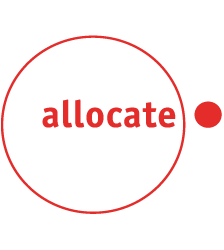Management Consulting
ONLY the result counts – mastering change and crises and understanding them as new opportunities
Today, in the age of major geostrategic crises, climate change and pandemics, the optimal allocation and safeguarding of all corporate resources decisively determines the future earnings and competitiveness of companies. In times when energy, capacity, capital, raw material and human resources are an increasingly scarce and expensive commodity for which companies compete on a global scale, the right strategic alignment and a critical success factor.
The allocate approach focuses on securing and optimally and sustainably aligning these essential resources. It is complemented by our many years of operational management experience in various industries as well as profound project experience in the consulting sector.
We solve the sometimes fundamental transformation challenges of our clients with a high level of professional and personal competence, closely involving management and employees on the client side. We differentiate and qualify ourselves through our unique combination of distinctive expertise and strong networks in selected industry sectors, an excellent and field-tested functional competence, an implementation and entrepreneurial driven consulting approach, a comprehensive expertise in all HR areas as well as our commitment to realize sustainable and value-adding potentials for our clients.
Future prospects and value enhancement through optimized resource allocation
A strategic realignment understood in this way means, especially in times of crisis, aligning companies holistically to the central trends and upheavals in the economic and geostrategic, technological, ecological and social environment. The demand-oriented and trend-compliant portfolio strategy controls an optimal allocation of equity through investment and disinvestment according to the best-owner principle and the opportunity-risk constellation. The degree of integration and self-sufficiency in the value chain is optimized in such a way that the basic supply and return on capital are secured in the long term.
We align the competitive strategies of the business units to their competencies and success factors and thus position them successfully vis-à-vis the competition. By means of coordinated raw material, product and market strategies, we convert advantageous positions into corporate success. Ambitious targets are reflected in operational action programs and cash flow planning.
“Find out what you are good at and match it with what the world wants and needs.”
– Henry Mintzberg
Allocations and management of capital resources
The central challenge is to provide financial resources on time and as needed – especially in times of crisis. Cash flow is allocated to the most promising business activities, investments and projects, taking into account the respective risk profile, and is also used to continuously secure liquidity. In this context, we often support our clients in restructuring projects and financial engineering to secure liquidity and operating cash flow for further development. This includes measures to reduce costs in order to stabilize the bottom line as well as an optimization of the credit and debt constellation.
After cash flow hedging and stabilization, the broader challenge is to identify reinvestment options that lead to a sustainable increase in enterprise value (or discounted cash flow). We support our clients with a proven approach to evaluating investment options that ensures sustainable consistency with strategy while maintaining a short- and medium-term return perspective. This approach is applicable to investments targeting organic growth as well as external growth options. In the area of growth, we provide our clients with targeted support throughout the entire M&A process: Identification of acquisition targets, detailed analysis of targets and shortlisting, due diligence, valuation and post-merger integration. In the end, the decisive factor is whether a transaction generates real value or whether the synergy potentials realized clearly exceed the purchase price paid.
The optimized structuring of project financing is also an important aspect in the allocation of financial resources. In this context, the formation of project companies and offshore financing should also be considered on a case-by-case basis in order to expand the possibilities of an individual company’s balance sheet. But we also support our clients in improving their liquidity in day-to-day operations: with our proven working capital management approach, we optimize all relevant levers, such as inventory management or accounts receivable and payable processes.
Allocation and management of energy and natural resources
The need for an economical, environmentally compatible and secure energy supply as well as the best possible use of natural resources and raw materials is growing and is strongly driven by the increasing supply bottlenecks for energy sources and raw materials as well as the associated price or cost increases in key industries. At the same time, there is growing concern that the use of various raw materials is having a negative impact on the environment and that individual associated costs – such as for CO2 certificates – are affecting the overall cost burden and the competitiveness of affected companies in global competition. In many cases, a fundamental conversion of the energy supply to renewable energies is a necessity in order to be able to guarantee security of supply, economic efficiency and environmental compatibility in equal measure in the future.
In this context, we also support our clients in making decisions on the optimal use of energy and materials. The most important lever lies in improving energy and material efficiency, leading to a reduction in consumption or an increase in resource efficiency. Examples include optimizing existing production structures with a view to smoothing volatile load curves for energy consumption, examining recycling options or, in terms of total value added, using hydrocarbons as a chemical feedstock instead of using them as an energy source.
The optimized use of energy and material resources is closely linked to health, safety and environmental aspects. For us, this is an important quality aspect and thus necessarily an integral part of our corporate strategy.
Allocation and management of capacity resources
International project complexity, cross-functional collaboration, synchronized processes, high innovation and implementation power, flanked by stringent cost management are key success factors of capital-intensive industries.
Against the background of long investment cycles, the balanced allocation and synchronization of available resources and capacities is of central importance. allocate supports this challenge with customized consulting services in the following functional and operational areas:
- Process Optimization & Organizational Development
- Purchasing & procurement excellence
- Integrated supply chain & logistics concepts
- Specific maintenance strategies & contractor management
- Post-merger integration & change management
The spectrum includes both corporate programs to increase effectiveness and efficiency, which are aimed at the fundamental synchronization of process flows with the organizational structure, and “Operational Excellence” initiatives for optimization in operational, production-related day-to-day business.
Allocate consultants have successfully supported many international companies in transformation programs that have led to the sustainable implementation of cost- and resource-efficient processes and to competence and performance leadership in operational core processes. The synchronization of all core processes and internal/external interfaces along the value chain formed the core challenge that we successfully solved for our clients through our integrated approach.

